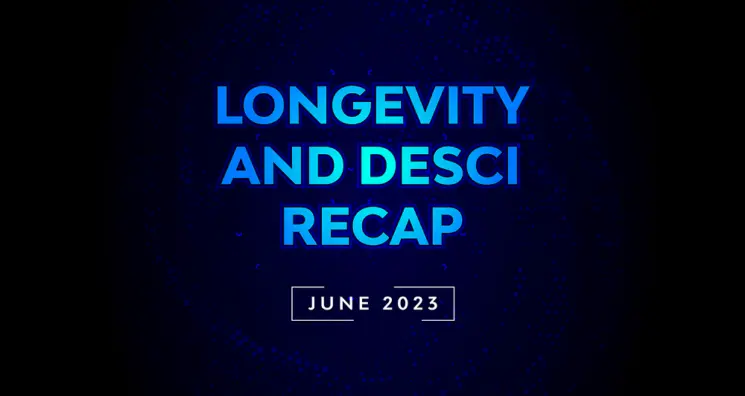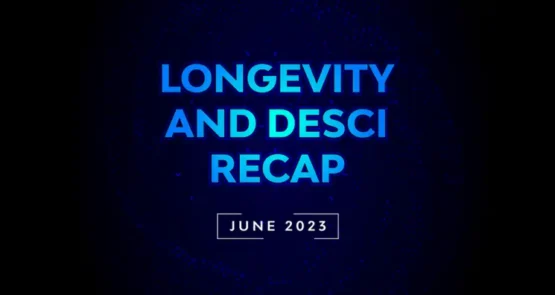Welcome to the premier edition of Lifespan.io’s newest release, the Longevity and DeSci Recap. Here, we’ll fill you in on the very latest interviews, insights, and research in the longevity biotech sphere, covering topics such as blockchain, DAOs, cryptocurrency, and decentralized science (DeSci) and letting you know about exciting events or studies coming up in the near future.
Spring has truly sprung, with exciting new developments in the Longevity and DeSci sector. As we move into the summer months, we are seeing early fruition in some initiatives, such as the drive to more defined regulation frameworks and AI-based solutions that are already in operation.
Longevity and DeSci news
Holistic health and wellness app, Centr, joins forces with Lifespan: On June 20, Lifespan announced its latest partnership with the wellness and fitness app, Centr, founded by actor Chris Hemsworth. This collaboration will see Lifespan’s biotech news and educational content becoming available for the first time on Centr.com and the Centr app, giving its users in-depth access to longevity wellness information that will help their fitness journey in the long term. It marks a significant step in the wider recognition and acceptance of longevity science in the health and well-being space.
Pop-up city event Zuzalu winds down as longevity development ramps up: Zuzalu was a month-long, experimental pop-up city event held along the picturesque coast of Montenegro. Crypto and longevity experts from around the world traveled to the tropical setting to attend this unusual extended conference into the future of longevity.

With Vitalik Buterin of Ethereum, the VitaDAO team (key organizers), Aubrey de Grey, and Amy Proal among many others, this immense event covered the latest innovations, investments, and plans to establish a more solidified regulatory future for the DAO sector, and was a kick-off point for productive discussions.
Lifespan.io journalist Arkadi Mazin was there, and you can read more of his thought-provoking insights in his special feature Zuzalu: Shining City on the Black Mountain.
Lifespan.io Executive Director Stephanie Dainow and Nathan Cheng, executive director of Longevity Biotech Fellowship, also teamed up to give a short overview of longevity biotech. Not everyone at the event was familiar with longevity and rejuvenation research, so this high-level summary proved helpful.
In-depth interviews with industry experts
Niklas Anzinger joined Lifespan’s Ryan O’Shea to discuss the new regulatory world: Crypto and blockchain technology are notoriously under-regulated industries, which is partly what has led to their initial success. On the other side, due to their close connection to financial issues, it’s becoming clearer that regulation is required to establish rules and norms within the evolving sector. The challenge is developing a suitable regulatory framework to fit the technological advancements.
Niklas Anzinger, founder of the Infinite VC fund, sat down with Lifespan.io’s own Ryan O’Shea to discuss the latest developments in Web3 and blockchain and explain why a new regulatory framework is needed for innovation to progress safely for everyone.
Arkadi Mazin talks longevity, AI and ethics with Vitalik Buterin at Zuzalu: There’s no other figure that looms quite so large in the world of blockchain technology as Vitalik Buterin, the founder of the Ethereum network. Our reporter Arkadi Mazin sat down with the innovator himself at Zuzalu to talk about longevity, artificial intelligence, and ethics.

Buterin reiterates his belief that the ties between AI and longevity can become closer to accelerate discoveries that promote healthy aging, explaining precisely how the worlds of technology and lifespan science are interconnected and should be. He also acknowledges concerns around the technology that were expressed by other industry experts, and he suggests that these can be somewhat addressed by transparency, accountability, and public participation.
Longevity investment and development news
ORA raises $10 million in a Series A round: Health tech is big business. In May this year, it was announced that the Singaporean telehealth platform Ora raised $10 million in Series A funding, seeking to support its expansion into new regions, including the Middle East. To date, the innovative platform has delivered more than a quarter of a million digital consultations across a variety of health concerns, including dermatology and male and female health.
NewLimit’s Series A success with $40 million: NewLimit is a start-up focused on epigenetic reprogramming, which is one of the hallmarks of aging. This latest funding round seeks to support the company’s efforts in developing new products and treatments that tackle age-related diseases, including fibrosis, infectious diseases, and neurodegenerative diseases.

Insilico adds AI and quantum computing to its stack: Drug discovery is often a long, drawn-out process that takes years to fully get the results required to make a confident decision. Early studies into the field suggest that AI could change all that, and one company (if not more) is putting it to the test.
Insilico Medicine is exploring how quantum computing and AI can be used to explore the advantages and disadvantages of quantum generative adversarial networks, which could yield more results in the future.
Knowledge and experience are key as health-tech companies bolster their teams: Lento Bio has started collaborations with a Florida State University researcher to develop new eye treatments for aging. Seeking to tackle Presbyopia, an age-related eye condition, the company is looking into the biotech world to improve their results.
Meanwhile, SENISCA, the senescence-focused biotech, Celmatix, the ovarian biotech, and Aviceda, a developer of next-level immunomodulators have all recently announced new additions to their boards seeking to bolster their teams with more experience in their operational spheres. These moves could indicate a broader pattern of growth within the industry and a drive to seek traditional experience on innovative projects.
Biotech Clene raises $40 million for clinical trials into neurodegenerative conditions: Clene Inc., a biopharmaceutical company targeting neurodegenerative diseases and developing treatments, has just raised $40 million in a recent financing round. Seeking to develop therapies that utilize nanocatalysis to enhance cellular bioenergetics and promote neuroprotection, the company plans to use this financial boost to start clinical trials for its top candidate, CNM-Au8.
Tech breakthroughs

AI digs through data to help discover rapamycin-like molecules: Able to analyze mass amounts of data at an impressive rate, AI and machine learning technologies have been put to the test in discovering rapamycin-like molecules among a large data sample.
Narrowing the search from a pool of 1,000 molecules to 132 likely candidates to just 29 that also have low toxicity, AI was instrumental in running the data to give those final numbers. Researchers were later then able to process these through an ADMET (absorption, distribution, metabolism, excretion, toxicity) profile to get one singular result, TKA001.
Having achieved this goal, they then ran it through an AI simulator to determine how effective it could be. While early results have proven promising in anti-aging use cases, more testing is required before this potential solution progresses down the pipeline.
DAOs and communities
Funding longevity science even faster: VitaDAO has just announced its sale of the VITA-FAST token. Tied to this DAO’s native token, $VITA, VITA-FAST is an IP governance token that allows access to an IP pool for an IP-NFT, giving holders the right to participate in the IP-NFT’s governance and its developments. The Korolchuk Lab, a longevity research lab looking into autophagy, is set to receive funding from this initiative to support its future efforts.
VitaDAO goes global with partnership with DeSci Japan: Founding a platform for researchers and managers to collaborate in a R&D system, the partnership between VitaDAO and DeSci Japan marks a new step in developing the democratic engagement required for scientific advances to become possible. Marking the start of their collaboration, the teams hosted an event in Japan aiming to engage the local community in their initiates.
AthenaDAO tackles longevity through women’s health: Newly launched decentralized autonomous organization AthenaDAO is tackling women’s health in the digital era. Following the footsteps of famous health tech brands, such as Flo, AthenaDAO draws on scientific research and decentralized technology to dive into women’s health and create solutions for collaborative funding, education, and access.
Challenges and controversies
How you can tell a genuine crypto project from a fake: As Web3 technology has developed further, so too have scammers trying to make a quick buck from people who are less adept at technology. With DAOs and other crypto projects now becoming valuable, recognised tools to get science done, our team has taken the time to bring together some of the most important things to watch out for when choosing to support a crypto or blockchain project.
Blueprint CEO, Bryan Johnson, supports AI use in making lifestyle and health decisions: Undoubtedly, AI (artificial intelligence) is the number one technology of 2023. However, in recent months, tech industry experts, including ChatGPT founder Sam Altman, have reported concerns about just how fast this technology is advancing and if society is prepared for its impact.
Contrary to this position, others, such as Blueprint CEO, Bryan Johnson, wholeheartedly support the use of AI technology as an effective tool for health management or potential micromanagement, as Lifespan.io news reporter Emmett Short suggests.
Johnson, who gained widespread recognition and criticism in mainstream media by spending $2 million a year on a proprietary anti-aging regime that includes various health treatments, medications and AI-based monitoring, has spoken about AI’s future at Healthspan Summit. While it is informative, Emmett Short believes it’s worth taking with a grain of salt.
World Longevity News
Patent granted for serotherapeutic technology targeting age-related conditions: In mid-June, it was announced that HCW Biologics had successfully filed, and was granted, a U.S. patent for a novel serotherapeutic therapy that seeks to target and eliminate senescent cells, which could have potential anti-aging implications. The granting of this patent might represent increased trust in the longevity industry as a whole.
Coming soon…
As we noted earlier in our recap, the 6th edition of the Ending-Age Related Diseases is fast approaching. With a focus on longevity and DeSci, this year’s summit is shaping up to be a fascinating event. For those unable to attend in person, online tickets are also available.
Let us know. Did you enjoy our Longevity and DeSci Recap? Perhaps you have a project or initiative you’d like to share with us? Get in touch with our team today.




